Related Research Articles

Edward Montagu, 2nd Earl of Manchester, KG, KB, FRS was an important commander of Parliamentary forces in the First English Civil War, and for a time Oliver Cromwell's superior.

The secretary of state for the colonies or colonial secretary was the British Cabinet minister in charge of managing the United Kingdom's various colonial dependencies.

Anthony Ashley Cooper, 1st Earl of Shaftesbury PC was a prominent English politician during the Interregnum and the reign of King Charles II. A founder of the Whig party, he was also the patron of John Locke.

The Duke of Roxburghe is a title in the peerage of Scotland created in 1707 along with the titles Marquess of Bowmont and Cessford, Earl of Kelso and Viscount Broxmouth. John Ker, 5th Earl of Roxburghe became the first holder of these titles. The title is derived from the royal burgh of Roxburgh in the Scottish Borders that in 1460 the Scots captured and destroyed.

Charles Spencer, 3rd Earl of Sunderland, KG, PC, known as Lord Spencer from 1688 to 1702, was an English statesman and nobleman from the Spencer family. He served as Lord Lieutenant of Ireland (1714–1717), Lord Privy Seal (1715–1716), Lord President of the Council (1718–1719) and First Lord of the Treasury (1718–1721).

Thomas Osborne, 1st Duke of Leeds,, was a prominent English politician. Under King Charles II, he was the leading figure in the government for around five years in the mid 1670s. He fell out of favour due to corruption and other scandals, and was impeached and eventually imprisoned in the Tower of London for five years until the accession of James II of England in 1685. In 1688 he was one of the Immortal Seven group that invited William III, Prince of Orange to depose James II as monarch during the Glorious Revolution. He was again the leading figure in government, known at the time as the Marquess of Carmarthen, for a few years in the early 1690s.
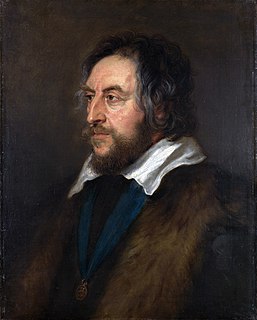
Thomas Howard, 14th Earl of Arundel KG, was a prominent English courtier during the reigns of King James I and King Charles I, but he made his name as a Grand Tourist and art collector rather than as a politician. When he died he possessed 700 paintings, along with large collections of sculpture, books, prints, drawings, and antique jewellery. Most of his collection of marble carvings, known as the Arundel marbles, was eventually left to the University of Oxford.

Wills Hill, 1st Marquess of Downshire,, known as The 2nd Viscount Hillsborough from 1742 to 1751 and as The 1st Earl of Hillsborough from 1751 to 1789, was a British politician of the Georgian era.

The Board of Trade is a British government body concerned with commerce and industry, currently within the Department for International Trade. Its full title is The Lords of the Committee of the Privy Council appointed for the consideration of all matters relating to Trade and Foreign Plantations, but is commonly known as the Board of Trade, and formerly known as the Lords of Trade and Plantations or Lords of Trade, and it has been a committee of the Privy Council of the United Kingdom. The board has gone through several evolutions, beginning with extensive involvement in colonial matters in the 17th century, to powerful regulatory functions in the Victorian Era, to virtually being dormant in the last third of 20th century. In 2017, it was revitalised as an advisory board headed by the International Trade Secretary who has nominally held the title of President of the Board of Trade, and who at present is the only privy counsellor of the board, the other members of the present board filling roles as advisers.
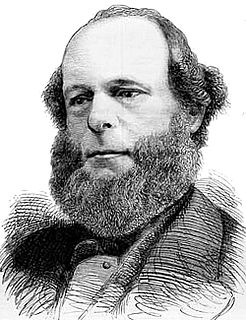
Richard Plantagenet Campbell Temple-Nugent-Brydges-Chandos-Grenville, 3rd Duke of Buckingham and Chandos, styled Earl Temple until 1839 and Marquess of Chandos from 1839 to 1861, was a British soldier, politician and administrator of the 19th century. He was a close friend and subordinate of Benjamin Disraeli and served as the Secretary of State for the Colonies from 1867 to 1868 and Governor of Madras from 1875 to 1880.
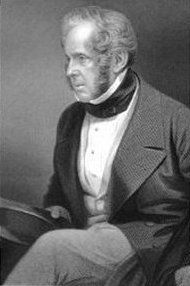
The Liberal government of the United Kingdom of Great Britain and Ireland that began in 1859 and ended in 1866 consisted of two ministries: the second Palmerston ministry and the second Russell ministry.
This is a list of people who have served as Lord Lieutenant of Surrey. Since 1737, all Lords Lieutenant have also been Custos Rotulorum of Surrey.
A lord proprietor is a person granted a royal charter for the establishment and government of an English colony in the 17th century. The plural of the term is "lords proprietors" or "lords proprietary".
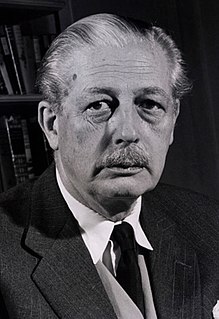
The Conservative government of the United Kingdom that began in 1957 and ended in 1964 consisted of three ministries: the first Macmillan ministry, second Macmillan ministry, and then the Douglas-Home ministry. They were respectively led by Harold Macmillan and Sir Alec Douglas-Home, who were appointed by Queen Elizabeth II.
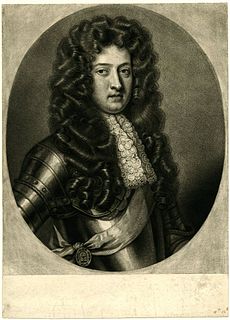
John Egerton, 3rd Earl of Bridgewater KB PC was a British nobleman from the Egerton family.

The Canningites, led by George Canning and then the Viscount Goderich as First Lord of the Treasury, governed the United Kingdom of Great Britain and Ireland from 1827 until 1828.

Richard Graham, 1st Viscount Preston PC was an English diplomat and politician who sat in the House of Commons in two periods between 1675 and 1689. He became a Jacobite conspirator, but his reputation in the Jacobite community suffered when he gave evidence against his co-conspirators in exchange for a pardon.
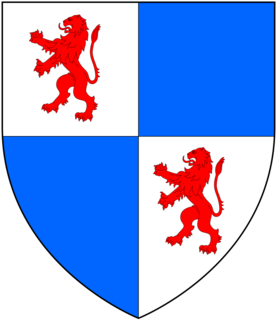
John Pollexfen (1636–1715), of Walbrooke House in the parish of St Stephen Walbrook, City of London and of Wembury House in Devon, was a merchant, a courtier to Kings Charles II and William III, and a political economist who served four times as a Member of Parliament for Plympton Erle in Devon, in 1679, 1681, 1689 and 1690. He was opposed to the monopoly of the East India Company.
References
- ↑ "Lords of Trade and Plantation". www.encyclopedia.com. Encyclopedia.com. Retrieved 19 June 2019.
- ↑ Office-Holders in Modern Britain: Volume 3, Officials of the Boards of Trade 1660-1870. London: University of London. 1974. pp. 25–27.